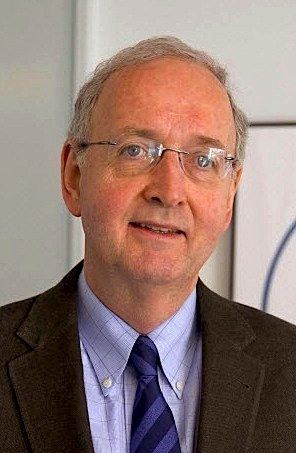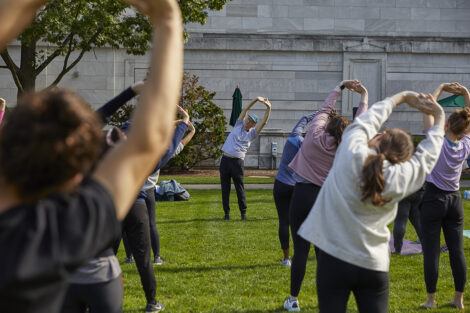January 10, 2022 – Once a week since the summer of 2017—except for a 15-month hiatus during the first part of the pandemic and currently because of Omicron—John McDonough has taught yoga to groups of male inmates at the Suffolk County House of Corrections in Boston.
McDonough, professor of public health practice in the Department of Health Policy and Management at Harvard T.H Chan School of Public Health, and director of Executive and Continuing Professional Education at the School, says that teaching yoga in prison is one of the most gratifying things he does. The inmates he teaches tell him that practicing helps lower their stress, improve their sleep, and ease their aches and pains—and for some, that it’s the highlight of their week.
“For all of us who are part of this work, we’re hooked on it,” he said.

McDonough said that yoga has been helpful not just for the Suffolk County inmates, but for him as well—for example, during the years he spent hard at work on health reform. Prior to coming to Harvard Chan School in 2010, McDonough led Health Care for All, Massachusetts’ leading consumer health advocacy organization, where he played a key role in the passage and implementation of the state’s 2006 health reform law. Then he spent two years in Washington, D.C., where, as a U.S. Senate adviser, he helped develop the Affordable Care Act.
In D.C., “I was looking for any kind of exercise place to work off steam,” he said. “I found a nearby studio and started a near-daily yoga practice for the first time and stayed with it even after coming back to Boston.”
Students at Harvard Chan School have had the opportunity to practice yoga with McDonough from time to time. In October, he led an outdoor session for students on the Harvard Medical School quad as part of an event presented by the Office for Student Affairs called “Stress Free Finals.” He also routinely begins his classes with a bit of yoga stretching or meditation. “It creates a kind of mental corridor that you cross coming into the class—a calming and differentiating effect,” he said.
The path to prison yoga
A few years ago, McDonough decided he wanted to share yoga’s benefits with others. He completed a 200-hour teacher training in 2016, thinking he might volunteer for a nonprofit. He discovered a Boston organization called the Hands to Heart Center–Yoga for the People, which connects volunteer teachers with social service agencies. His first yoga gig was at the Eritrean Community Center in the South End, where, on Saturday mornings from 2017–19, he taught a group of mostly older women. “They totally loved it and dug it,” he said. “And I learned a lot about Eritrea.”
Around the same time he heard about people who were teaching yoga in prison. “But I didn’t know where to start,” he said. “So I did what anybody does these days. I Googled ‘prison yoga.’”
The Google search turned up a national organization based in California called the Prison Yoga Project (PYP). When McDonough saw that PYP was offering a training in April 2017 in Hartford, Conn., he signed up. One of the things he learned at the training is that it’s best to arrange yoga mats in a circle, not in rows, so that no one is in front of or behind anyone else. “At the end of the weekend, everybody was psyched,” McDonough said. “There were about eight of us from Massachusetts, and someone said, ‘Why don’t we start a PYP chapter in our state?’ Our first meeting was in May 2017 in my living room.”
The group has now grown to about 30 volunteers. McDonough, who in 2018 did an additional 300-hour yoga training, serves as one of three co-chairs. Pre-pandemic, the group had placed trainers in more than 15 correctional facilities throughout the state, but many volunteer activities, including yoga, were suspended in March 2020. Yoga resumed at the Suffolk County House of Corrections last June, but it was suspended again on January 3 because of the spread of the Omicron variant.
He looks forward to getting back to teaching at the prison, when it’s reopened. At Suffolk, he teaches male inmates, and female members of the Massachusetts PYP chapter teaches women. He said that when they first started volunteering the staff were suspicious of them.
“We got looks like ‘Who are these hippies walking in here? Are they smuggling drugs?’ Which is a totally legitimate concern,” he said. “But over time—rain, shine, snow, whatever—we would always show up, and now we’re much more accepted and treated nicely by everybody. Now we’re just ‘the yoga people.’”
Photo: Kent Dayton
